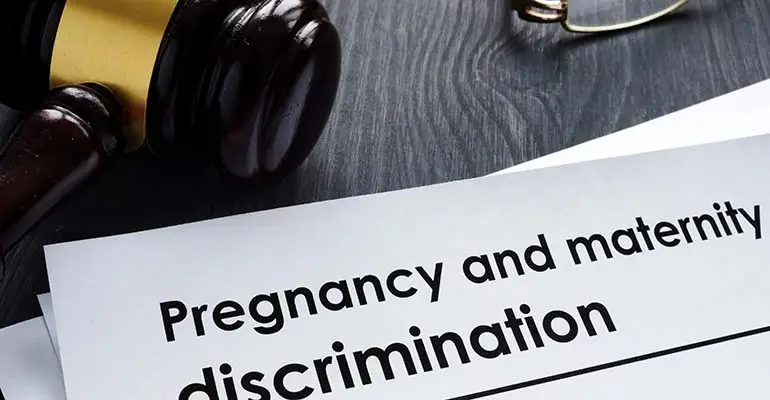Returning to Work: Dealing with Discrimination After Maternity Leave

Maternity leave discrimination negatively affects the lives and careers of mothers throughout Florida — and it is against the law. If you have returned to work after taking time off to have a baby and believe you have been discriminated against, you may have a case against your employer.
What is Maternity Discrimination?
Maternity discrimination occurs when an employer has unfavorably treated you because you have recently given birth or are breastfeeding. If you were fired after returning to work, this could also be considered discrimination after maternity leave.
If your employer retaliated against you after complaining about a situation or incident that you believed amounted to pregnancy discrimination, this could also be grounds for a case due to employment law violations.
Who is protected?
Employees in the private and public sectors are protected against maternity leave discrimination in the workplace. These protections for employees cover workers across industries, from information technology to hospitality and retail to healthcare. Employees in city, county, state and federal governments are protected by state and federal law and local ordinances.
Examples of Maternity Leave Discrimination
Employers may take a wide variety of actions that could be considered discrimination after maternity leave. Some are more subtle, and others can be very direct. Each situation will vary, and one or more could apply to you.
Here are examples of maternity leave discrimination:
- Fired from your job after taking maternity leave
- Not being allowed to return to the same job when you return to work
- Having responsibilities taken away from you that you had before maternity leave
- Denied a promotion after taking maternity leave
- Denied training other employees at your level received that were key to a promotion or raise in salary/wages
- Assigned duties not previously part of your job as punishment, such as heavy lifting
- Not being allowed sufficient breaks to pump breast milk if you are breastfeeding
- Cutting your hours after returning to work after taking maternity leave
These examples represent a significant portion of maternity leave discrimination but are not necessarily comprehensive. Other types of mistreatments or retaliation may occur that could amount to discrimination after maternity leave.
Because acts of discrimination can have serious consequences to a mother’s career, family, and financial security, it is recommended to consult with an employee rights attorney. They are experts in employment law and can examine the details of your situation to determine if you have a legal pathway to hold your employer accountable for violations of the law.
Federal and State Laws Protecting Your Rights
Multiple laws protect your rights in the workplace after taking maternity leave, which includes both federal and state laws.
The Pregnancy Discrimination Act (PDA) of 1978 prohibits sex discrimination based on pregnancy. It was enacted under Title VII of the Civil Rights Act of 1964 and is backed by the federal government’s authority. The PDA covers all aspects of employment, including promotions, time off, benefits, etc. Pregnant women and those coming back to work after taking maternity leave have the right to equal treatment. It is mandated under the law.
The Americans with Disabilities Act (ADA) of 1990 is another federal law that can protect employees against maternity discrimination. If you become disabled while pregnant, you may be covered under the ADA, which includes medical conditions such as gestational diabetes, anemia, and depression. You may be covered when you come back to work after the baby is born and be eligible for accommodations in the workplace or potentially working at home or other related protections.
The Family and Medical Leave Act (FMLA) of 1993 gives eligible workers up to 12 weeks off work each year for maternity leave, childbirth, and recovery from childbirth. Typically, you need to be employed at your company for at least 12 months and have worked at least 1,250 hours to qualify for benefits under the FMLA. If your employer forced you to come back before those 12 weeks were completed or punished you after taking that time off under FMLA, you might have a case.
Employees also are protected under state law. The purpose of the Florida Civil Rights Act (FCRA) of 1992 is to “secure for all individuals within the state freedom from discrimination because of race, color, religion, sex, pregnancy, national origin, age, handicap, or marital status.”
With the variety of legal protections available to Florida mothers facing discrimination after maternity leave, it is advised to consult with an attorney experienced in workplace discrimination cases to determine the best legal strategy for your situation to obtain the best possible outcome.
What To Do If Facing Discrimination After Maternity Leave
If you are facing discrimination after maternity leave, know that you do not have to face it alone. An employment law attorney acts as your legal advocate when your employer breaks the law. Female workers have the right to have a family and a career and should never be mistreated, punished, or retaliated against for taking maternity leave.
Wenzel Fenton Cabassa, P.A. fights hard for the rights of mothers across Florida. We understand the complexities of employment law and the legal processes necessary to make a claim against employers — and hold them accountable for their actions. We are here for you every step of the way as we work diligently to get a successful resolution to your case, which could include significant compensation.
Contact us today for a free, confidential case evaluation. We help employees get the justice they deserve and tackle discrimination after maternity leave aggressively with you and your family in mind.
Please Note: At the time this article was written, the information contained within it was current based on the prevailing law at the time. Laws and precedents are subject to change, so this information may not be up to date. Always speak with a law firm regarding any legal situation to get the most current information available.
Related Posts
Recent Posts
- False Claims Act Retaliation & Your Rights
- Fired for Being Pregnant? 5 Situations When You Should Call an Employment Lawyer
- Can My Boss Take My Tips? The Laws of Tip Ownership
- What Does “Meets FCRA Requirements” Mean?
- Can Your Employer Contact You While on Medical Leave? Know Your FMLA Rights in Florida
Contact Us

FREE HELP GUIDES
Dealing with unpaid wages, discrimination or wrongful termination? Get the information you need to protect your workplace rights. We offer employment law resources to help you fight for workplace justice.


